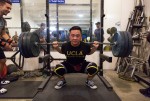Gym rats are often content going through the same workout routines. However, that isn’t for everyone.
“I felt that (working out) wasn’t very rewarding and it was very subjective,” said UCLA Powerlifting president Marc Morgan. “Your body can change and look good one day but bad another, and there’s nothing to quantify your progress besides pictures.”
The chemistry/materials science student initially watched bodybuilding videos on YouTube to get inspiration for his workouts, which eventually introduced him to powerlifting.
Morgan didn’t realize UCLA had a club team until he noticed a fellow gym goer wearing a UCLA Powerlifting shirt. After asking about it, he decided to try the team’s two-week trial period to get a feel for the sport.
He began going to every practice once he got started.
“I liked the team aspect, because I’ve always played sports all my life – I like being on a team and working towards the same goal,” Morgan said.
With its emphasis on weights, powerlifting provided Morgan with a goal-oriented alternative to working out.
“Powerlifting is very black and white,” Morgan said. “You couldn’t get this weight before, you worked really hard for months, and then you accomplish your goal and set new goals. That’s probably been my favorite part about it, because it’s so rewarding in that aspect to see yourself getting stronger.”
Co-vice president Jenna Minami also found the sport appealing for the same reasons. She had noticed that many gym goers made it their goal to work out so that they could embody a more fit, healthy image.
“When you think of working out, it’s mainly for aesthetics, like looking a certain way,” the rising third year said. “I had done that for quite a while, but it just led to a lot of stress, worry and bad body image.”
Minami said that she felt empowered when she went to Bruin Fitness Center and saw girls involved in a sport that centered on strength and reaching individual goals instead.
“All these things about how you can look bulky if you lift weights – like no, that’s not a thing.” Minami said. She hopes to get more female representation on the roster this year and show more women how powerlifting is a fun, unisex sport.
It was a woman who first informed recent graduate Martin Brenner of the UCLA powerlifting club team.
Brenner had been lifting weights as a supplemental workout when he rowed crew in high school. He continued lifting recreationally on his own in college, where he noticed a 5-foot-2-inch, 120-pound woman at the John Wooden Center squatting the same weight as him.
She was wearing a UCLA Powerlifting shirt, and after talking to her about the team, Brenner soon started sporting one as well.
“You can see your progress very obviously,” Brenner, who will attend Harvard Law School in the fall, said. “A lot of people go to the gym for a workout and to stay in shape, and I’m not the type of person that can really do that. I need an underlying goal to strive for, and that’s definitely something that powerlifting helps quantify.
One long-term goal for the team has been expanding membership.
With a fluctuating membership of around 10 to 15 consistent lifters, the team falls short of matching some of the larger, more developed teams around the nation.
Although competitions only happen periodically, the team practices four days a week under Drake Stadium in a space it calls the “Bear Cave,” which has become its main facility after space became challenging to find at Wooden.
“The Bear Cave is really small and we get no marketing aspect out of that because no one knows we exist,” Morgan said. “So it’s hard to get strong members to join the team.”
He aims to get the team in Wooden once a week for more exposure and build a closer relationship with USA Powerlifting to potentially host future competitions at UCLA. Last year’s team was one of the biggest its ever been, which makes Morgan hopeful for the upcoming year.
“The sport is growing so a lot of people are familiar with it now, which is definitely going to help out a lot,” Morgan said. “We just have to make our presence known.”
For Minami, powerlifting helped her develop a mentality of not giving up on herself. She was able to apply that to academics and the rest of life as well.
“(Powerlifting) teaches you humility but can also give you a confidence boost when you need it,” Minami said. “It really gives you highs and lows, but it’s all in a good way.”
Although still small in numbers, the team brings together people who share the same sort of drive and desire to do something more structured with their exercise.
“I’m a very goal-oriented person, so setting a weight that I want to hit in the gym, it’s very easy to picture that in your mind and work towards it,” Brenner said. “And that gives your training meaning.”
And for powerlifters, that meaning has very tangible rewards.
“Usually you reach these goals and that allows you to re-evaluate and realize, ‘Wow, a week ago, I wasn’t even close to this,’ ” Brenner said. “That’s what kept me going – I wanted to keep reaching new heights.”
